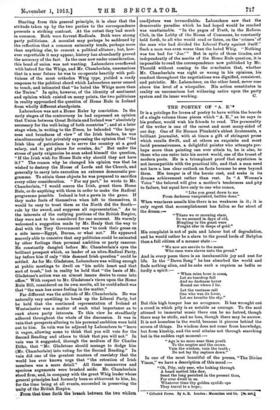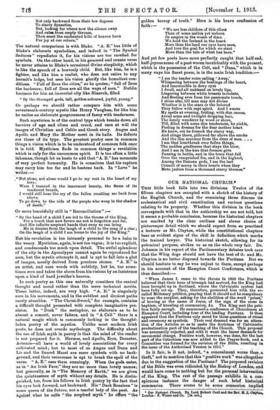THE POETRY OF "A. E."*
Iv is a privilege for lovers of poetry to have within the boards of a single volume those pieces which "A. E.," as he says in his preface, would wish his friends to read. The personality
of the writer is one of the rarest and most many-sided of
our day. One of Sir Horace Plunkett's ablest lieutenants, a brilliant journalist, with at times a gift of stringent prose which recalls Swift, and at others an exquisite and most lucid persuasiveness, a delightful painter who attempts per- haps more than painting can ever attain to, he is also, to those who can enter into his secret world, one of the truest of modern poets. He is a triumphant proof that mysticism is not incompatible with the practical life, and that a man need not have a less clear outlook on facts because he sees beyond them. His temper is of the heroic cast, and seeks in its dreams achievement rather than rest. In "A Woman's
Voice" the beloved will give a mother's tenderness and pity to failure, but equal love only to one who comes,
"Like yon great dawn to me From darkness vanquished, battles done."
When weariness assails him there is no weakness in it ; it is only regret that accomplishment has fallen so far short of the dream "Titans we or morning stars, So we seemed in days of old, Mingling in the giant wars Fought afar in deeps of gold."
His complaint is not of pain and labour but of degradation, and he would rather be a slave to the proud lords of Babylon than a full citizen of a meaner state :—
"We now are servile to the mean
Who once were slaves unto the proud."
And in every poem there is an inexhaustible joy and zest for life. In the "Dawn Song" he has absorbed the world and finds nothing alien, and he asks such a requiem as befits so lordly a spirit :—
But this high temper has no arrogance. It has wrought out a creed in which pity is as notable as courage. To the soul attuned to immortal music there can be no hatred, though there may be strife, and no loss, though there may be sorrow. It is not homeless in the world, because it pierces behind the screen of things. Its wisdom does not come from knowledge, but from kinship, and the soul attains not through searching but in the sudden rapt moment :— " Age is no more near than youth To the sceptre and the crown. Vain the wisdom, vain the truth ; Do not lay thy rapture down."
In one of the most beautiful of the poems, "The Divine Vision," we have a description of this mood :—
"Oh, Pity, only seer, who looking through A heart melted like dew,
Seest the long perished in the present thus, For ever dwell in us.
Whatever time thy golden eyelids ope They travel to a hope;
• Collected l'oents. By A, E, Loudon; Macmillan ang Cc, VC net.
"When mine hour is come, Let no teardrop fall And no darkness hover Round me where I lie.
Let the vastness call One who was its lover, Let me breathe the sky."
Not only backward from their low degrees To starry dynasties, But, looking far where now the silence owns And rules from empty thrones, Thou seest the enchanted hills of heaven burn For joy at our return."
The natural comparison is with Blake. "A. E." has little of Blake's elaborate symbolism, and indeed in "The Symbol Seduces" repudiates it, for his visions are too rarefied for symbols. On the other hand, in his gemmed and ornate verse he never attains to Blake's occasional divine simplicity, which is like the speech of a heavenly child. But, like him, he is a fighter, and like him a realist, who does not retire to any
hermit's lodge, but sees his vision glorify the homeliest con- ditions. "Full of Zeus the cities," so he quotes; "full of Zeus
the harbours ; full of Zeus are all the ways of men." Dublin becomes for him an immortal city like Nineveh, filled
"By the thronged gods, tall, golden-coloured, joyful, young."
Or perhaps we should rather compare him with some seventeenth-century mystic like Henry Vaughan, for like him he unites an elaborate gorgeousness of fancy with tenderness.
Such mysticism is of the central type which breaks down all barriers of age and clime and creed, and uses at will the images of Christian and Celtic and Greek story. Angus and Apollo and Mary the Mother meet in its halls. Its defects are those of its type. The greatest poetry sees in common things a vision which is to be understood of common folk once it is told. Mysticism finds in common things a revelation which is only for the uncommon spirit. It is too often a little inhuman, though let us haste to add that "A. E." has moments of very perfect humanity. He is conscious that his rapture may carry him too far and he hastens back. In "Love" he writes:—
,"Not alone, not alone would I go to my rest in the heart of my love :
Were I tranced in the innermost beauty, the flame of its tenderest breath,
I would still hear the cry of the fallen recalling me back from above,
To go down to the side of the people who weep in the shadow of death."
Or more beautifully still in "Reconciliation" :—
"By the hand of a child I am led to the throne of the King,
For a touch that now fevers Ins not is forgotten and far, And His infinite seeptred hands that sway us can bring Me in dreams from the laugh of a child to the song of a star ;
On the laugh of a child I am borne to the joy of the King."
But his revelation is too intensely personal to be a balm to the weary. Mysticism, again, is not too vague; it is too explicit, and condescends too much upon detail. The awful splendour of the city in the Apocalypse cannot again be reproduced for
men, but the mystic attempts it, and is apt to fall into a glut of images, mostly derived from precious stones. "A. E." is an artist, and uses words with subtlety, but he, too some- times errs and takes the sheen from his visions by an insistence upon a kind of hard jeweller's heaven.
In such poetry as this one naturally considers the central thought and mood rather than the mere technical merits.
These latter, indeed, are very high. "A. E." is singularly sure in his movements, and in the subtlest and dizziest paths rarely stumbles. "The Christ-Sword," for example, contains a difficult thought presented with complete imaginative pre- cision. In " Dusk " the metaphor, so elaborate as to be almost a conceit, never falters, and in "A Call" there is a natural magic which is commonly lacking in the thought- laden poetry of the mystics. Unlike most modern Irish poets, be does not overdo mythology. The difficulty about the use of Irish myth in poetry is that the mind of the reader is not prepared for it. Hermes, and Apollo, Eros, Demeter, Artemis—all have a world of lovely associations for every cultivated mind ; but to most of us Angus and Dana and Lit and the Sacred Hazel are mere symbols with no back- ground, and their recurrence is apt to break the spell of the verse. "A. E." uses them cunningly. When the gods enter, as in "An Irish Face," they are no more than lovely names; but generally, as in "The Memory of Earth," we are given the quintessence of myth without any details. He is distin- guished, too, from his fellows in Irish poetry by the fact that his eyes look forward, not backward. His" Dark Rosaleen" is some queen of the future, not a tearful lady of the past. As itgainat what he calls "the sceptred myth" he offers "the golden heresy of truth." Here is his brave confession of faith:—
"We are less children of this clime Than of some nation yet unborn Or empire in the womb of time.
We hold the Ireland in the heart More than the land our eyes have seen, And love the goal for which we start More than the tale of what has been."
And yet few poets have more perfectly caught that half-sad, half-joyous sense of a past woven inextricably with the present, which is the possession of the Celt, and "Dana," which is in many ways his finest poem, is in the main Irish tradition :— " I am the tender voice calling 'Away,' Whispering between the beatings of the heart, And inaccessible in dewy eyes I dwell, and all nnkissed on lovely lips, Lingering between white breasts inviolate, And fleeting ever from the passionate touch, I shine afar, till man may not divine
Whether it is the stars or the beloved They follow with rapt spirit. And I weave My spells at evening, folding, with dim caress, Aerial arms and twilight dropping hair, The lonely wanderer by wood or shore, Till, filled with some dim tenderness, he yields, Feeling in dreams for the dear mother heart He knew, ere he forsook the starry way, And clings there, pillowed far above the smoke And the dim murmur from the duns of men. . . I am that heartbreak over fallen things, The sudden gentleness that stays the blow, And I am in the kiss that foemen give Pausing in battle, and in the tears that fall Over the vanquished foe, and in the highest, Among the Darman gods, I am the last Council of mercy in their hearts when they Mete justice from a thousand starry thrones."































































 Previous page
Previous page